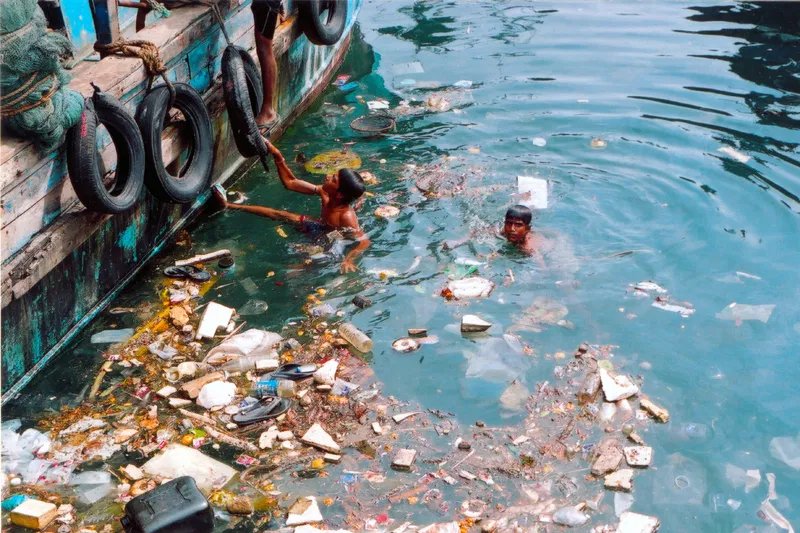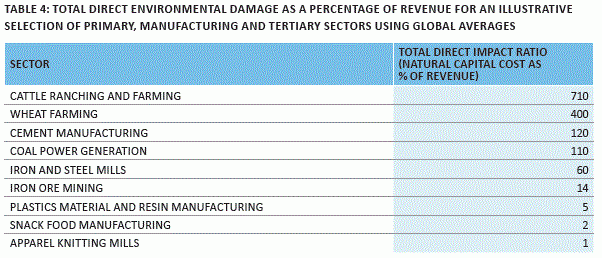
Date: 2025-12-15 Page is: DBtxt003.php txt00018788
Enhanced Accountability
True Performance unsustainable
New UN report finds almost no industry profitable if environmental costs were included
Peter Burgess
This is an incredibly important report. When will we show and pay the TRUE COST of products, including ALL the real costs?...

'A new report by Trucost on behalf of The Economics of Ecosystems and Biodiversity (TEEB) program sponsored by United Nations Environmental Program, examined the #money earned by the biggest #industries on this planet, and contrasted them with 100 different types of #environmental #costs, under 6 categories: #wateruse, #landuse, greenhouse gas #emissions, #waste pollution, land #pollution, and water pollution.
They found that when you took the #externalized costs into effect, essentially NONE of the industries was actually making a #profit. The huge profit margins made by the world’s most profitable industries (oil, meat, tobacco, mining, electronics) is being paid for against the #future: we are trading long term #sustainability for the benefit of #shareholders. Sometimes the environmental costs vastly outweighed revenue, meaning that these industries would be constantly losing money had they actually been paying for the ecological damage and strain they were causing.'...
https://lnkd.in/ds5nGT3 No alt text provided for this image New UN report finds almost no industry profitable if environmental costs were included exposingtruth.com LIKE INTEREST 22 6 Comments
Most Relevant Peter Burgess
--------------------------------------
See profile for Peter BurgessStatus is online Peter Burgess You Founder/CEO at TrueValueMetrics.org developing True Value Impact Accounting
So true ... take the infamous Paradise fire in California which actually resulted in the electric utility filing for bankruptcy protection because the truevalue of its performance resulted in a massive amount of value destruction ... way more than the modest cost savings they had realized from operating old and outdated equipment. Business Leaders have encouraged corporate profits to grow and grow and grow and paid no attention to the huge costs of social degradation and environmental catastrophe. Now because of the Covid-19 emergency, we have all sorts of low paid workers being deemed essential ... we are terrible hypocrites. The issues referenced in the UN report have been written about for a long time, but it is just talk, with nobody actually stepping up to change anything. Most of my generation of leaders have become financially rich, but morally bankrupt. It makes me mad as hell! PeterB #TVM
--------------------------------------------------------
New UN report finds almost no industry profitable if environmental costs were included posted by Michael Thomas April 9, 2015
If you haven’t been paying attention, I don’t blame you for at first not believing this. After all, companies go to great lengths to greenwash their image and present themselves as progressive and environmentally responsible, even while they turn your land to deserts and your oceans into dead zones. Unfortunately, as Mark Twain once famously said: “It’s easier to fool people than to convince them that they have been fooled.”
The truth is that our current system allows pretty much every corporation to externalize both environmental and social costs. In this article, we won’t even be touching on social costs. If you don’t know what cost externalization is, you can imagine it as making someone else pay part or all of your costs. For example, BP externalized the environmental costs of the Deepwater Horizon disaster by consuming all of the profits but making the government pay for anything beyond the most shoddy and superficial attempts at stopping the crisis.
A new report by Trucost on behalf of The Economics of Ecosystems and Biodiversity (TEEB) program sponsored by United Nations Environmental Program, examined the money earned by the biggest industries on this planet, and then contrasted them with 100 different types of environmental costs. To make this easier, they turned these 100 categories into 6: water use, land use, greenhouse gas emissions, waste pollution, land pollution, and water pollution.
The report found that when you took the externalized costs into effect, essentially NONE of the industries was actually making a profit. The huge profit margins being made by the world’s most profitable industries (oil, meat, tobacco, mining, electronics) is being paid for against the future: we are trading long term sustainability for the benefit of shareholders. Sometimes the environmental costs vastly outweighed revenue, meaning that these industries would be constantly losing money had they actually been paying for the ecological damage and strain they were causing.
 trucosttop5regionsectors
trucosttop5regionsectors
In terms of land and water use: almost no companies are actually paying a price remotely comparable for what they are actually taking away from the ecosystems. Consider that fact that Nestle pumps water out of drought-ridden California without limits for an unannounced but extremely low price, and turns around and sells this exact same water back to those affected by the resulting droughts for approximate $4 billion profit per year (based on 2012 data).
The even scarier fact in all this is that the indirect costs “downstream” from the industries are actually even greater. Here are the top 5 sectors passing along insane costs:

trucostdirectindirect
If you didn’t notice yet: meat and coal are probably the largest offenders. If you look at table 2 again, you can see that cattle ranching in South America carries 18 times a higher environmental cost than all the revenue it brings in. Once you think about this, it is probably less surprising that 91% of Amazon rainforest destruction is fueled by increased animal agriculture.
How much money would these companies be losing if they were actually covering the environmental costs or paying to reduce their environmental impact? Well, the report also covers this:

trucostnaturalvsrevenue
So, now that it has become abundantly clear that our current regulatory system is corrupt/deficient, what do we do about it? Well, firstly we need to stop allowing companies to pretend that they are “environmentally responsible” when they are worse behaved than any child you have ever met. If someone came in and destroyed your kitchen to make you a piece of bread with butter, demanded money for it, and then bragged about being a “responsible cook,” it wouldn’t be any less ridiculous.
After we have stopped tolerating the bullshit, we need to seek and support actual solutions. We have to be willing to boycott and campaign against “cheap” products that are actually environmentally costly, as well as putting pressure onto governments to amend their regulations. Why should we expect companies to change if neither consumers or governments are forcing them?
To finish up, I will include what the Trucost report suggests for industries, investors, and governments. Please join in helping inform people about this situation, about these costs, and helping create more pressure to remove these “externalities.”

Search the site
POPULAR POST // SRECENT POSTS Homosexuality Is Natural Homosexuality Is Natural by Aaron Jackson
Marijuana’s Long Term Effects On The Brain Finally Revealed Marijuana’s Long Term Effects On The Brain Finally Revealed by Michael Thomas
Scientists say giant asteroid could hit earth next week, causing mass destruction Scientists say giant asteroid could hit earth next week, causing mass destruction by Aaron Jackson
Why GMOs Are Not Your Enemy Why GMOs Are Not Your Enemy by Michael Thomas
Contrails – Countering the fear-porn of Chemtrails Contrails – Countering the fear-porn of Chemtrails by Asura
Looking at the “Evidence” in the Steven Avery case Looking at the “Evidence” in the Steven Avery case by Michael Thomas
The Truth about GMOs The Truth about GMOs by Michael Thomas